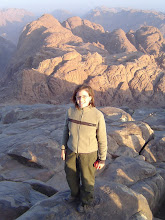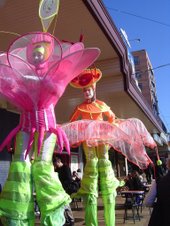Two days of New Year? Yes, that's right. Why, I hear you ask? Hmm, good question. This is one that I've wondered about for several years. You see, I am aware that many Jewish Holidays are traditionally celebrated for two days OUTSIDE Israel (the first/second night passover seder, for example). Why? Because in times past, the Hebrew calendar depended on witnesses in Jerusalem appearing before the Sanhedrin to report that they'd sighted a new moon, and hence the beginning of a new month. If no moon was sighted (let's say it was cloudy), the month would be deemed to begin on the next day - and it would be clear on which night each Jewish holiday for that month would fall. However, Jews exiled in Babylonia couldn't necessarily know that a new moon had been sighted in Jerusalem and hence they would celebrate two nights in a row, to ensure they didn't get the date wrong.
So, let's now put aside the fact that we no longer need witnesses to tell us when there is a new moon. WHY would this two-day rule apply in Israel? According to my research on the Internizzle,
"On Rosh HaShana this problem was compounded. Since Rosh HaShana was the first day of the month, immediately upon the Sanhedrin's declaration it would be Yom Tov (actually earlier because of the doubt). It would therefore be prohibited for the messengers to leave the city limits (techum) of Jerusalem. Thus no one outside of Jerusalem would know when the Yom Tov began. It was therefore necessary for all residents of Israel as well to keep two days of Rosh HaShana.
BUT - further reading shows that in Israel, once a "fixed" calendar had been introduced in the 4th century, Rosh Hashana become a one-day affair INSIDE Israel and remained a two-day chag OUTSIDE Israel. According to Rabbi David Bar-Hayim, whose article I found on the web, it was only in the 12th Century that the two-day observance was re-introduced back into practice in Israel by some powerful European rebbes who migrated back to Israel. It's all quite interesting - you can read more about it here


If you follow up on the 'read more' link from this posting, I Highly recommend watching and listening to the clip " Cantor puts twist on Rosh Hashanah prayer" . Be patient it comes on AFTER the Ford Mondeo ad in Hebrew !!
ReplyDelete